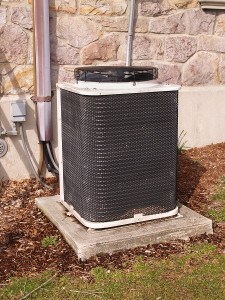Intense heat Texas and other parts of the country have experienced this summer has made thefts of air conditioning units by criminals looking to sell their metal for scrap into a literally unbearable crime.
 The thefts themselves aren’t related to the weather, but to the high prices thieves can get for the copper and other metal parts inside the units, said Houston police Sgt. Michael McGinty, who runs a metal theft squad in operation since 2007.
The thefts themselves aren’t related to the weather, but to the high prices thieves can get for the copper and other metal parts inside the units, said Houston police Sgt. Michael McGinty, who runs a metal theft squad in operation since 2007.
And the theft of one air conditioner may even have contributed to the death of an elderly Dallas woman last month.
The crime isn’t new, but McGinty said he and his team of five investigators have seen an increase in the number of thefts involving air conditioners this summer in Houston. The squad is handling 230 metal theft cases each month, with 90 to 95 related to air conditioning units. Other parts of the country, including Georgia, Chicago and Philadelphia have also dealt with similar crimes this summer.
“Right now it’s making the most detrimental effect because of the intense heat we are having,” McGinty said Friday. “Now it’s getting more attention as far as all these people are living without it because they just don’t have the money to replace it.”
In Dallas, 79-year-old Dolores Grissom was found dead in her home two days after she reported her unit stolen. Authorities say her death was heat-related.
“If the heat ain’t killing you, somebody else is,” neighbor Caroline Ware said Friday as she sat on her front porch and tried to enjoy a bit of cool morning shade. “It’s getting so we can’t even live.”
Ware, 68, said her daughter, who also lives in the area, had two window air conditioning units stolen last week.
Dallas Police spokesman Cpl. Jerry Monreal declined to comment on Grissom’s case.
In the small town of Willis, about 50 miles north or Houston, thieves a few months ago had tried to take the four air conditioning units at Trinity Baptist Church.
To protect the units, metal cages and locks were placed around them, said Steve Bassett, one of the church’s deacons. But late last month, thieves pried open the metal cages and stole two of the units.
“I thought I had enough locks on them but I guess I didn’t,” Bassett said.
Thanks to a local businessman, the church was able to replace the units for about $2,300 within a few days and without affecting services. Along with the cost of buying new locks, as well as motion lights, the church ended up paying $3,000. Bassett said his church, with a congregation of about 50, could barely afford the cost.
“I just don’t understand people stealing from churches,” he said.
The church plans to install more security equipment, including a surveillance camera that takes photographs when motion sensors are triggered.
In northwest Houston, an apartment complex has had nearly 60 air conditioners stolen in the last few months, including about 20 in one night earlier this month, said A.J. Sultan, the building’s owner.
The thefts aren’t limited to Texas.
In Chicago, thieves in June made off with two air conditioning units at an animal shelter, costing the facility $25,000. In North Carolina, authorities in Wayne County said thieves took at least seven air conditioning units in June, mostly from vacant homes or businesses. In Philadelphia, thieves in July stole or damaged air conditioning units at a small Presbyterian church, forcing members of the congregation to rely on fans to get through Sunday services.
And in DeKalb County, Ga., just east of Atlanta, police in June broke up a ring that had been stealing dozens of air conditioning units worth about $200,000.
“They would go to various locations and load air conditioners on a U-Haul truck and take it to an abandoned home and break the units down,” said Mekka Parish, a spokeswoman for DeKalb County police.
The impact from air conditioning thefts probably hasn’t been as bad for Atlanta-area residents this year because that part of Georgia has not experienced the same oppressive summer heat that has taken place in Texas and other parts of the country, she said.
The thefts in Houston have continued even though people selling metal to scrap yards must present identification. A new Texas law set to go into effect Sept. 1 will require all scrap yards in the state to do the same.
“The key will be law enforcement,” McGinty said. “When I was in Austin, I told lawmakers, ‘You can pass any law you want but if you don’t have boots on the ground, it won’t matter.”‘
(Associated Press writer Linda Stewart Ball in Dallas contributed to this report)
Was this article valuable?
Here are more articles you may enjoy.

 Building Fortification And The Role of The Insurance Industry
Building Fortification And The Role of The Insurance Industry  Gas-Guzzler Revival Risks Dead-End Future for US Automakers
Gas-Guzzler Revival Risks Dead-End Future for US Automakers  Besieged Berkshire Utility Tries to Rewrite Who Pays for Wildfires
Besieged Berkshire Utility Tries to Rewrite Who Pays for Wildfires  NYC Travel Snarled by Snow as Central Park Gets 15 Inches
NYC Travel Snarled by Snow as Central Park Gets 15 Inches 